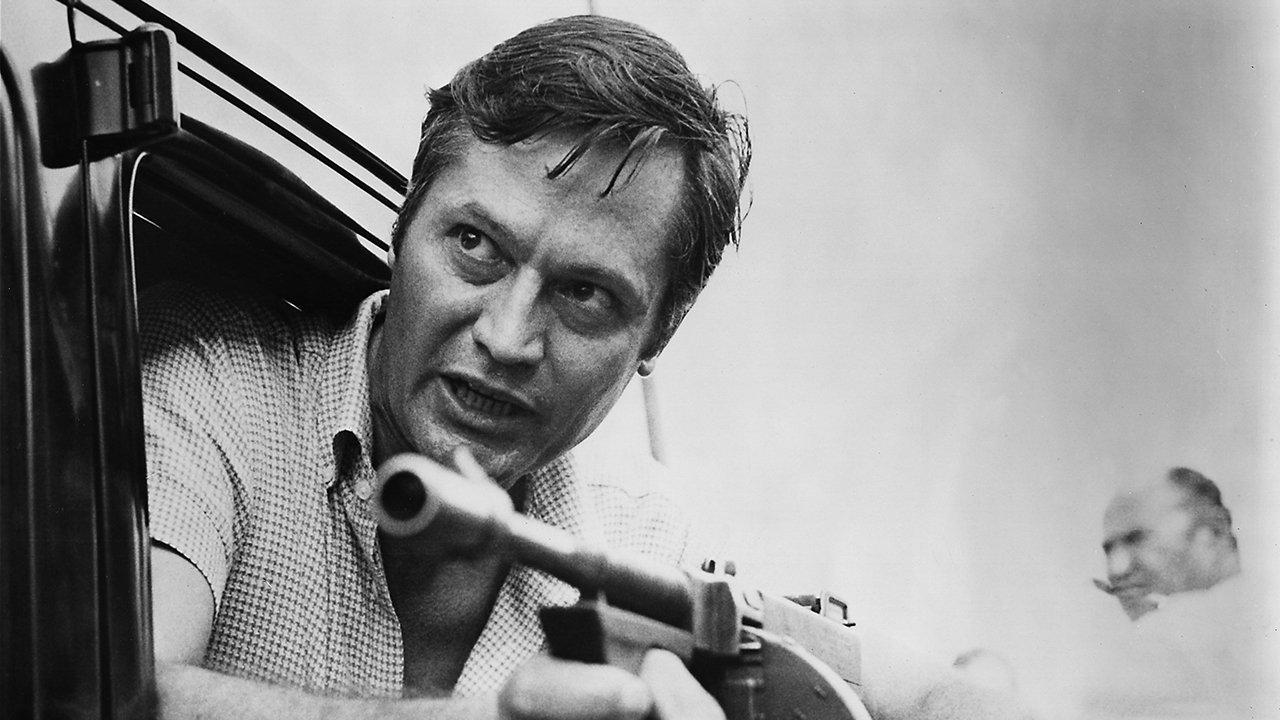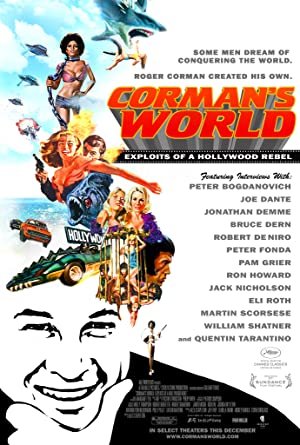In the world of film geeks, Roger Corman is a legend. The man has over 400 movies to his name as a producer, directed 56 of them, and was responsible for giving the first film jobs to an illustrious list of talents that includes Martin Scorsese, Jack Nicholson, Joe Dante, Peter Fonda, Francis Ford Coppola, and Jonathan Demme. Yet, despite what his reputation might suggest, Corman is not a man known for making films that play in art houses or are taught in film schools. Nope, Roger Corman is the king of schlock, a fiercely independent filmmaking machine who filled drive ins and grindhouse theaters with some of the finest B-movie entertainment his penny pinching budgets could buy from the 50s through the 70s.
His influence is vast and while the man behind double bill fillers like Little Shop Of Horrors, Caged Heat, Hot Car Girl, Attack Of The Crab Monsters, andSharktopus might not sound like odd subject matter for a career retrospective documentary, Alex Stapleton’s loving tribute Corman’s World: Exploits Of A Hollywood Rebel is an insightful and star-packed blast of entertainment about cinema’s most important trash merchant.
Corman entered the movie business long before the days of film school. He worked his way up to a position as script reader in the studio system in the 50s, but after becoming frustrated for receiving no credit on the story notes he relayed that frequently found their way into the films, he set out on his own to produce a micro-budget monster movie. It made money and Corman’s career was off. Working primarily with American International Pictures, the man became legendary for his quick n’ cheap ways that always turned a profit (he legendarily shot the original Little Shop Of Horrors over a weekend because there were sets leftover from another movie available for that timeframe). His budgets rose for a series of gorgeous, campy, and brilliant Edgar Allan Poe adaptations with Vincent Price like Pit And The Pendulum. He was the first recognize a new youth audience in the 60s and made a fortune with the first biker movie The Wild Angels and the LCD odyssey The Trip. Then in 1970 he left AIP and went independent again, creating his own studio New World Pictures, producing movies with budgets that made the AIP productions look like blockbusters and employing untested youngsters who went on to become the future darlings of movieland.
Corman was a talented filmmaker and a brilliant businessman. He knew what ideas would sell and happily raised the bar for onscreen sex n’ violence to thrilled drive in audiences across America. He had an impeccable eye for talent and nurtured countless filmmakers through “The Roger Corman Film School,” joking that if the young guns did their job well enough on his terms, they’d never have to work for him again. He still makes movies now, but in the 80s/90s found himself working for the direct-to-video market with titles like Carnosaur and now fills out the ScyFy channel’s late night slate with the likes of Dinocroc Vs. Supergator. The reason is simple, Hollywood adopted his filmmaking formula in the 80s. When the studios weren’t plucking talent from his reservoirs, they started taking his ideas. Jaws and Star Wars were essentially Roger Corman movies with a budget and once they became massive hits, Corman’s B-movies became Hollywood A-movies and gradually the screens that would play his work disappeared.
It’s an incredibly entertaining life story from a quiet and unassuming man who you would never expect to supervise a women-in-prison picture. Corman’s not some sleazeball dying to put as many blood covered boobs onscreen as possible (well, at least not openly), he’s merely a man who knew how to give the audience what they want and often even used the profits of his B-movies to get foreign art house fair by the likes of Fellini, Bergman, and Truffaut on American screens. Alex Stapleton’s incredibly entertaining documentary breezes through Corman’s career at a incredible clip, feeling as entertaining as any Corman production. We get to see the man at work on his latest movie, but most of the time is spent with Corman and his adoring friends/collaborators spinning yarns about the old days.
You can feel genuine affection from Dante, Howard, Demme, Scorsese, and others as they vividly remember getting their first job from Corman and how the lessons he taught them about working quickly and responsibly stick with them to this day. Jack Nicholson even breaks down in tears recalling how Corman was the only man who would hire him in Hollywood for ten years and how much those opportunities meant to him. There’s a genuine sense of how important this man was to so many lives and when the movie climaxes with Corman getting a much deserved lifetime achievement award from the Oscars (delivered by Quentin Tarantino with Nicholson beaming in the front row), it feels like a sweet climax. More than anything else, the film imparts the insane, goofy atmosphere Corman created around himself and his collaborators in his 60s and 70s heyday. He formed a community of likeminded outsiders who never would have been accepted by the conventional Hollywood system. The creative work they did on his drive-in friendly dime launched careers and forever altered the industry, for better or worse.
Corman’s World: Exploits Of A Hollywood Rebel is a ludicrously entertaining and important slice of Hollywood history. Corman’s name and work might not carry the cultural cache amongst burgeoning young movie buffs n’ filmmakers as it once did, but thankfully this documentary is a perfect introduction for the uninitiated. Filled with goofily entertaining clips of his movies as well as adoring praise from his famous collaborators, Alex Stapleton’s delightful documentary perfectly puts Corman into historical context and rightfully honors an important filmmaker who rarely gets the respect he deserves. It’s an essential slice of exploitation film history. Plus it’s all presented in a package that’s a joy to watch and appropriately deriding to the Hollywood establishment. Of course it is. Good ol’ Roger wouldn’t have it any other way.





